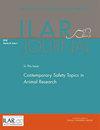The Role of IACUCs in Responsible Animal Research.
IF 3.1
3区 农林科学
Q1 VETERINARY SCIENCES
引用次数: 17
Abstract
In order to ensure animal welfare during the course of scientific enquiry, there is a strong framework of animal welfare standards for the use of animals in biomedical research [1]. Within the United states much of animal research in the public sector is covered under the Public Health Service Policy on Humane Care and Use of Laboratory Animals (PHS Policy), which is under the provision of the Health Research Extension Act (HREA, 1985) (Public Law 99-158) [2]. The PHS Policy requires that all institutions using live vertebrate animals in PHS supported research must have an institutional animal care and use committee (IACUC) to oversee the care and use of its animals. These institutions are required to use the Guide for the Care and Use of Laboratory Animals (Guide), as a primary standard for implementing their animal care and use programs. Compliance with the Animal Welfare Act Regulations (AWARs) is also an important requirement of the PHS Policy. Per the PHS policy, the IACUC must have at least five members including the chairperson, a veterinarian with direct or delegated program authority, a practicing scientist, a member whose primary concerns are in a nonscientific area, and a member who is not affiliated with the institution other than as a member of the IACUC. The AWAR requirements for IACUC composition are that it consists of at least three members including a veterinarian and a member not affiliated with the institution. In addition to ensuring ethical and humane use of animals, the IACUC, due to its structure and function, is uniquely positioned to contribute to the quality of scientific work performed at an institution [3]. Quality of scientific research output is supported by sound experimental design and strategy, rigorous and comprehensive evaluation criteria, responsible research practices, and adequate oversight and training. Additionally, many of the same factors that affect the quality of animal welfare may also impact the quality of scientific research. It is a well-known fact that healthy animals housed in optimal conditions yield the most reliable data, whereas compromised welfare negatively impacts physiology, immunology, and behavior of animals leading to skewed and misrepresented results [3,4]. Additionally, variables in animal care and health can affect repeatability and reproducibility of experiments, and standardization of practices within an animal care program can help reduce variability [4]. Factors that can be standardized to a certain extent include housing practices (lighting, temperature, food, bedding, noise levels, etc.), genetic background, animal source, and health status (disease status, gut microflora, etc.) [4]. While at an institutional level, responsible research is a broad concept encompassing everything from conflict of interest to reproducibility to data management, the conduct of day-today research practices in a reliable manner is what constitutes responsible research. The central role of IACUCs in research animal use and oversight helps it safeguard responsible animal research by ensuring ethical, scientifically sound, standardized practices in animal research. The various roles of the IACUC in responsible animal research are outlined in the chart below (Figure 1) and will be discussed further in this review.IACUC在负责任动物研究中的作用。
为了确保科学研究过程中的动物福利,在生物医学研究中使用动物有一个强有力的动物福利标准框架[1]。在美国,公共部门的大部分动物研究都涵盖在《实验室动物人道护理和使用公共卫生服务政策》(PHS政策)中,该政策符合《健康研究扩展法》(HREA,1985)(公法99-158)[2]的规定。PHS政策要求,在PHS支持的研究中使用活脊椎动物的所有机构都必须有一个机构动物护理和使用委员会(IACUC)来监督其动物的护理和使用。这些机构必须使用《实验动物护理和使用指南》(指南),作为实施其动物护理和利用计划的主要标准。遵守《动物福利法条例》也是PHS政策的一项重要要求。根据PHS政策,IACUC必须至少有五名成员,包括主席、一名具有直接或授权项目权限的兽医、一名执业科学家、一名主要关注非科学领域的成员,以及一名除IACUC成员外与该机构无关的成员。AWAR对IACUC组成的要求是,它至少由三名成员组成,包括一名兽医和一名不隶属于该机构的成员。除了确保动物的伦理和人道使用外,IACUC由于其结构和功能,在提高机构科学工作质量方面具有独特的地位[3]。科学研究成果的质量得到了健全的实验设计和策略、严格和全面的评估标准、负责任的研究实践以及充分的监督和培训的支持。此外,许多影响动物福利质量的因素也可能影响科学研究的质量。众所周知,在最佳条件下饲养的健康动物会产生最可靠的数据,而福利受损会对动物的生理、免疫学和行为产生负面影响,导致结果失真[3,4]。此外,动物护理和健康中的变量会影响实验的可重复性和再现性,动物护理计划中实践的标准化有助于减少可变性[4]。可以在一定程度上标准化的因素包括住房实践(照明、温度、食物、床上用品、噪音水平等)、遗传背景、动物来源和健康状况(疾病状况、肠道菌群等)[4]。虽然在机构层面上,负责任的研究是一个广泛的概念,涵盖了从利益冲突到再现性再到数据管理的方方面面,但以可靠的方式进行当今的研究实践才是负责任研究的组成部分。IACUC在研究动物使用和监督方面的核心作用有助于通过确保动物研究中的道德、科学、标准化做法来保障负责任的动物研究。IACUC在负责任的动物研究中的各种作用如下图所示(图1),并将在本综述中进一步讨论。
本文章由计算机程序翻译,如有差异,请以英文原文为准。
求助全文
约1分钟内获得全文
求助全文
来源期刊

Ilar Journal
农林科学-兽医学
CiteScore
5.10
自引率
20.00%
发文量
8
审稿时长
>18 weeks
期刊介绍:
The ILAR Journal is the peer-reviewed, theme-oriented publication of the Institute for Laboratory Animal Research (ILAR), which provides timely information for all who study, use, care for, and oversee the use of animals in research. The journal publishes original articles that review research on animals either as direct subjects or as surrogates for humans. According to policy, any previously unpublished animal research reported in the ILAR Journal will have been conducted according to the scientific, technical, and humanely appropriate guidelines current at the time the research was conducted in accordance with the Guide for the Care and Use of Laboratory Animals or other guidance provided by taxonomically-oriented professional societies (e.g., American Society of Mammalogy) as referenced in the Guide.
 求助内容:
求助内容: 应助结果提醒方式:
应助结果提醒方式:


